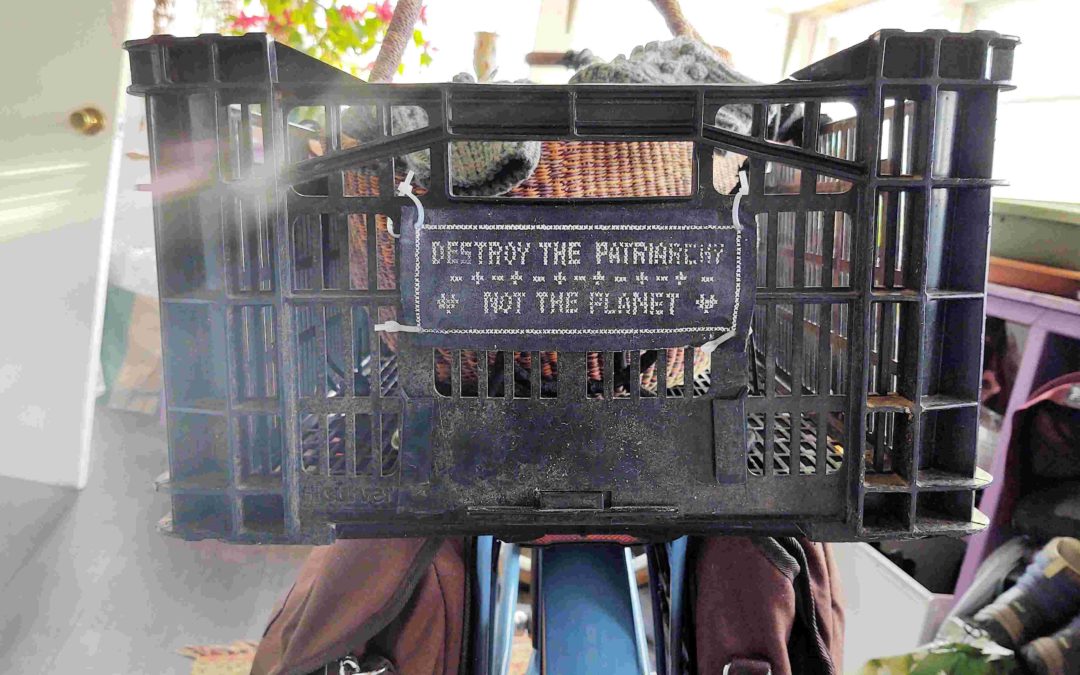The relationships between spatial and temporal dimensions clarify when one ditches the automobile in exchange for feet and a bicycle. Slowing down to a natural human pace, I feel a nostalgic linking across pasts, presents, and futures – a remembrance of a simpler, carefree childhood, when time was rarely measured, and spatial relationships manifested in a felt bodily awareness. Driving a personal vehicle from place to place for all my adult life (apart from walking and biking as a form of exercise), I realize how the world outside the car blurs, becoming backdrop, reinforcing the bifurcation of humans from the more-than-human world. How can one connect when one is encased by metal and glass, whizzing past the world at speeds no human would otherwise achieve? But this separation is mere delusion. For while humans in their cars, on their highways, on their ways to various human-designed and built spaces can ignore the more-than-human world, the more-than-human world cannot ignore the climate-altering gases spewing from tailpipes, the coal-fired powerplants climate controlling their constructed spaces, or the deforestation, mining, and toxic contamination required to extract the materials needed to maintain the delusion. As much as we can construct narratives that we are separate from our environment, such constructions are nonsense. Everything we do co-creates the world, for better or worse (Bawaka-Country et al., 2020; Bawaka-Country et al., 2016).
As I pedal to the farmers’ market, I relax into the unscheduled mind space that opens up in the absence of quick transportation. I will get there when I get there, spend as much time as I need to, and then head home. I have dedicated a whole day to this adventure. I feel a familiar urgency in the cars zipping past me on Asheville’s bicycle-unfriendly roads, heading everywhere in a hurry. I am grateful that most motorists are polite. In fact, my life probably depends on it. In the squeezed narrow roads without bike lanes, they must wait patiently to pass me in the presence of oncoming traffic. Many then put pedal to the metal and fly past, anxious to make up for those few lost seconds. On my bike, I am unable to somnambulate through traffic, as I often did in my car. I am very much in the world – wind in my face, sun (and rain) on my back, taking in every sound and sensation.
An interesting and beneficial byproduct of my self-induced braking to bipedal speed has been that time itself seems to slow. In fact (ironically), a relatively recent study discovered similarly that the “time-saving” technologies modern Western humans have grown accustomed to actually accelerate one’s temporal awareness (MacDonald, 2015). Embedded in technological, as opposed to more-than-human worlds, time flies by, and the minutes saved using technology are usually used up pursuing a Western capitalist agenda instead of actually enjoying one’s life. A recent Gallup (2017) poll found that of the 100,000,000 employees in the American workforce, only one third find their jobs fulfilling and enjoyable.
My capacity to rewild time undoubtedly reflects my white, settler, land “owning,” middle-class privilege. On the other hand, refusing to engage with consumerist capitalism, I spent in total only $30 this week at the farmer’s market. In the absence of television, shopping for things I thought I needed, and compulsive attention to social media, I read more, sleep better, save money, and generally feel less stressed. And, I have the great satisfaction of knowing this week, that my carbon footprint is negative (I planted some trees) and that nothing I did enriched the pockets of the already-rich corporate masters who are destroying the planet.
However, as I attempt to re-condition myself to the natural rhythms of the more-than-human world, the time constructions of Western contemporary life still confound my attempts. The tick-tock of the clock forces me to conform, whether I want to or not. Yoga at noon, farmers markets on Tuesdays and Wednesdays, deadlines, appointments – I can’t seem to avoid the scheduling that characterizes globalized Western life. And I begin to experience that this scheduling is not just a benign tool. A certain quality of tension or anxiety flutters up when I glance at the calendar and the scribblings that commandeer my freedom for an hour or two here and there. Scheduling minutes, hours, days, and weeks comprise such a ubiquitous part of Western daily lives, it has come to seem natural, inevitable, unquestionable. I wonder. Do our constructions of time serve or enslave us? And can different notions of time liberate us? What other seemingly imperative narratives (e.g., about work) could we reject to create happier, healthier communities?
References
References
Bawaka-Country, Wright, S., Suchet-Pearson, S., Lloyd, K., Burarrwanga, L., Ganambarr, R., . . . Maymuru, D. (2020). Gathering of the Clouds: Attending to Indigenous understandings of time and climte through songspirals. Geoforum, 108, 295-304.
Bawaka-Country, Wright, S., Suchet-Pearson, S., Lloyd, K., Burarrwanga, L., Ganambarr, R., . . . Sweeney, J. (2016). Cobecoming Bawaka. Progress in Human Geography, 40(4), 455-475.
Gallup. (2017). State of the American Workplace. Retrieved from https://www.gallup.com/workplace/238085/state-american-workplace-report-2017.aspx?thank-you-report-form=1
MacDonald, F. (2015). Science says that technology is speeding up our brains’ perception of time. Science Alert. Retrieved from https://www.sciencealert.com/research-suggests-that-technology-is-speeding-up-our-perception-of-time
